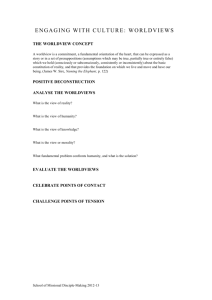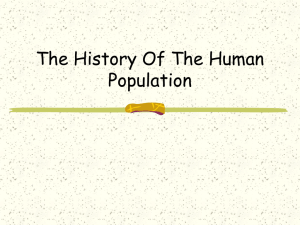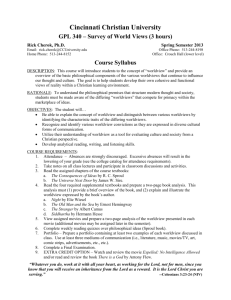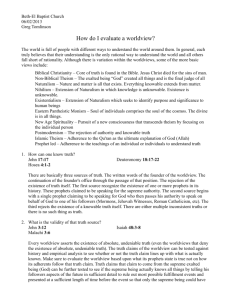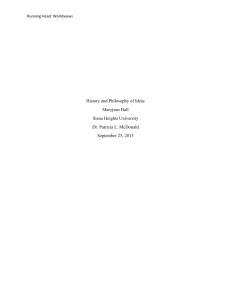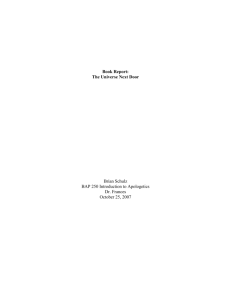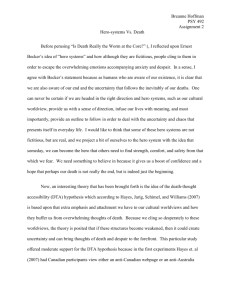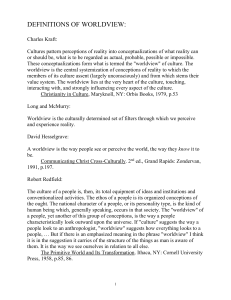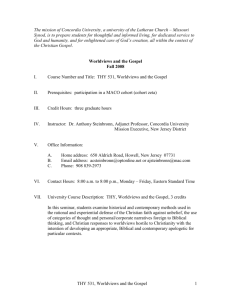Always-Be-Prepared-Using-Evidences-for
advertisement
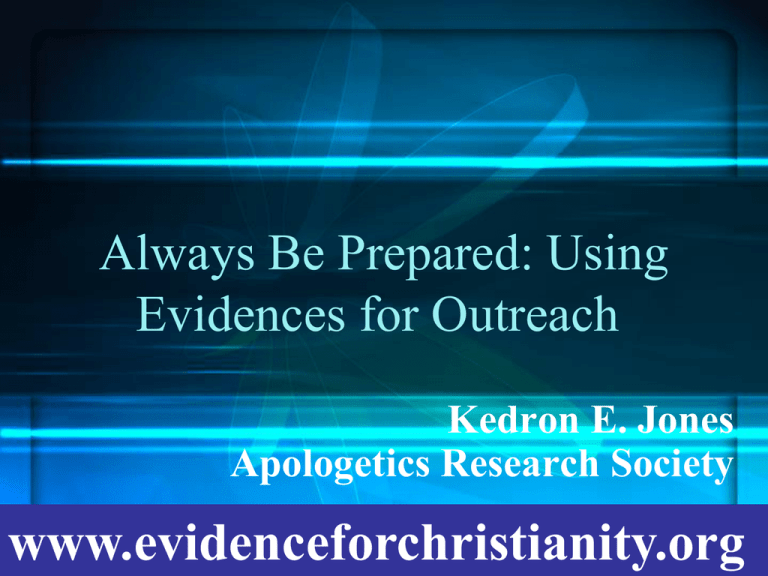
Always Be Prepared: Using Evidences for Outreach Kedron E. Jones Apologetics Research Society www.evidenceforchristianity.org A Brief History of Philosophy • Philosophers have attempted to answer four foundational questions in life. A Brief History of Philosophy • Questions about Epistemology (i.e., How do we know what we know is true?). A Brief History of Philosophy • Questions about Metaphysics (What is the origin of the universe?). A Brief History of Philosophy • Questions about Ethics (i.e., What is good and what is evil?). A Brief History of Philosophy • Questions about Laws of Logic (Reasoning conducted according to strict principles of validity) A Brief History of Philosophy • Everyone has a philosophy of life called a worldview. What Is A Worldview? • A Worldview is a lens through which we see the world. • We all have a worldview (even if you don’t think you have one). Worldviews In Conflict • “A worldview is a network of presuppositions which are not tested by natural science and in terms of which all experience is related and interpreted.” -Greg L. Bahnsen- Worldviews In Conflict • Stoic Philosophers vs. Epicurean Philosophers Worldviews In Conflict Proverbs 26:4-5 “Do not answer a fool according to his folly, or you will be like him yourself.” “Answer a fool according to his folly, or he will be wise in his own eyes.” Worldviews In Conflict A Checklist for Defending The Faith Key Intellectual Sins Committed By People: 1. Arbitrariness: Something based on random choice or personal whim, rather than any reason or system. 2. Inconsistencies: Acting at variance with one’s own principles or former conduct. A Checklist for Defending The Faith Ask yourself the question when dialoguing with the unbeliever, “Is this argument arbitrary?” 1. Mere Opinion: Opinions are just opinions, they are not truth. 2. Relativism: “That’s true for you but not for me.” 3. Ignorant Conjectures: A guess or assumption based on ignorance. 4. Unargued Bias: Even if you show that the Bible is consistent he dismisses miracles. A Checklist for Defending The Faith Ask yourself the question when dialoguing with the unbeliever, “Are there logical fallacies?” 1. Look for contradictory beliefs: On one hand your professor believes that our behavior is determined by antecedent factors and is predicable, yet when you take a test in his class he trust that you will freely choose not to cheat. A Checklist for Defending The Faith Ask yourself the question when dialoguing with the unbeliever, “Are there logical fallacies?” 2. Look for behavior that betrays his beliefs: Someone may argue that there are no moral absolutes and then condemn murderers and rapist. Case Studies Epistemology (How do we know what we know?) “Science proves everything eventually, and your denying that is just funny and sad at the same time.” http://forum.thatfatatheist.com/topic/8913172/1/ Case Studies Metaphysics (What is the origin of the universe? What’s man’s place in the world) “Free will is an illusion. Our wills are simply not of our own making. Thoughts and intentions emerge from background causes of which we are unaware and over which we exert no conscious control. We do not have.” -Sam Harris, Free Will Case Studies Ethics (i.e., What is good and what is evil?). “Right and wrong are a matter of opinion, and as a result, at the end of the day, their intentions are the only thing that matters.” http://www.fighunter.com/index.php?page=com ment_single&c=52473 Case Studies Laws of Logic (Reasoning conducted according to strict principles of validity). Guilt By Association: Rejecting someone’s argument because of the person’s friends, religion and etc. Example: “I think all Christians are hypocritical, after all look at what happened during the Inquisition!” The Real Problem With Unbelievers • It is an issue of the heart (Romans 1:18-25). • It is an issue of their worldview. • Not an issue of a lack of evidence for the God of Christianity. Summary • The problem between the believer and unbeliever isn’t an issue of facts, it is an issue of worldviews. • All worldviews attempt to answer the four major questions in life. • Show the unbeliever the consequences of living it out his worldview. “Where is the wise? Where is the scribe? Where is the disputer of this age? Has not God made foolish the wisdom of this world?” Questions & Answers
